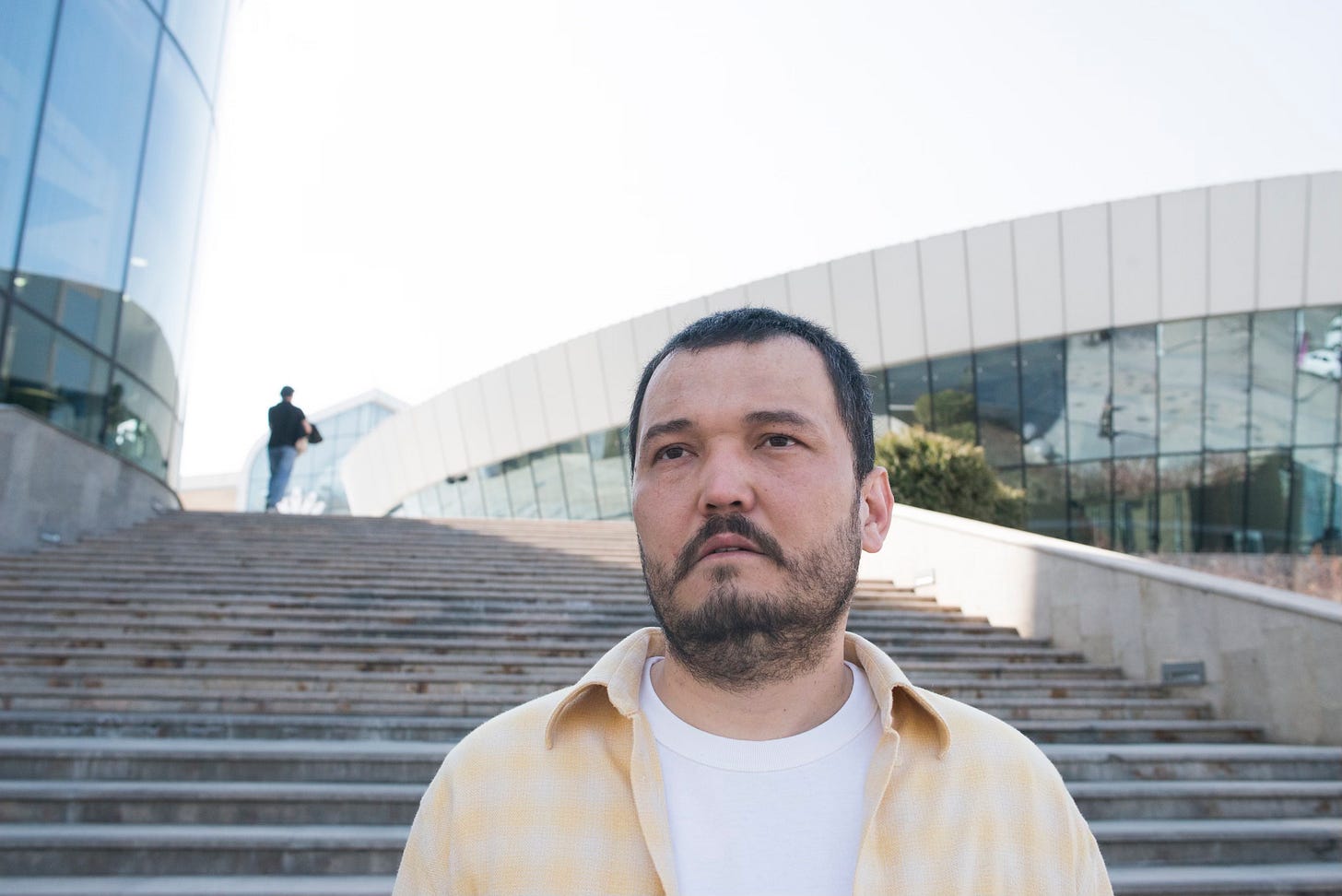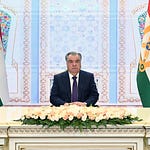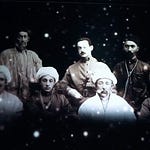Aqylbek Muratbai, 36, has never committed a crime. But in mid-February this year, he left his jail cell in a suburb of Almaty, Kazakhstan’s former capital, after a year in detention. The city had not changed during this year of absence, Muratbai says, though the village where his parents now live has gained internet access.
But in a way, the world has undergone a paradigm shift. In late January, three weeks before Muratbai was released from detention, the United States President Donald Trump announced the suspension of the Refugee Admission Programme, a flagship US initiative established in 1980 to resettle particularly vulnerable refugees to the United States – and one that was meant to bring Muratbai to safety.
Muratbai, a member of the Karakalpak ethnic group, was arrested in February 2024 at the request of his homeland, Uzbekistan, which accused him of inciting mass riots and distributing extremist materials. For these two offenses, he could face up to 18 years in prison.
But as the extradition to his motherland was being processed, Muratbai applied for asylum in Kazakhstan, which temporarily halted his removal from the country. In the meantime, the US embassy began plotting to extract him and other Karakalpak activists, who were wanted by Uzbekistan, out from Kazakhstan and transfer them to the United States.
In autumn 2024, four of Muratbai’s colleagues from the Karakalpak diaspora in Kazakhstan, and their families, boarded a plane heading to Dayton, Ohio, where for the past two decades a large Karakalpak community has put down roots. Muratbai, an outspoken critic of Uzbekistan’s treatment of the Karakalpak minority, was not on board that plane. But he hoped that once his temporary detention ended, he would join the rest of his comrades in the safety of Ohio.
However, the world in which Muratbai was discharged when he walked out of his cell on a cold February morning was different from the one he knew back in 2024. Release only brought him a temporary feeling of elation. He could smell the hair of his beloved wife, hug his parents and his little sister, and walk freely breathing the dear smoggy Almaty air. But soon, the burden of the rapidly changing world struck back – a world where the rules that he had taken for granted no longer applied.
Over the past 45 years, the Refugee Admission Programme, a public-private and bipartisan initiative, has provided shelter to over three million refugees from around the world, who were thoroughly vetted for security by more than a dozen federal agencies in a process that often took years.
In 2025, the US was set to admit up to 125,000 people. However, although the courts in the Pacito v. Trumpcase ordered the administration to continue resettling over 100,000 refugees who have been approved as of Trump’s inauguration day, the process has virtually stalled. After nearly half a century of being a promised land for people fleeing persecution around the world, the US is no longer willing be the leader of the free world.
“It's like I'm in a different world, in a totally different geopolitical situation. A world where Trump came to power and started doing a lot of things that have been, to put it mildly, unconventional,” Muratbai told Turan Talesover the phone. “In Ukraine, Russia is beginning to prevail – the world was not as tense when I was arrested. I could not follow the news in jail. Now I’m constantly scrolling my news feed, and I feel that what's happened in the world, in just a year, is all too scary.”
Muratbai moved to Kazakhstan in 2010, after a brief stay in Russia, to start his own business. His company was successful; he earned decent money and began building a home in a new country. But something was missing. He craved a sense of community that would help him put down roots.
“I started to get involved in civic activism. In Russia and in Kazakhstan, I saw that ethnic Uzbeks and Tajiks all had their communities. There were businessmen who networked with each other, and when their compatriots got into trouble, they helped them out. So, I started looking for my own people,” Muratbai said.
Karakalpaks make up about 2.5 percent of Uzbekistan’s population and differ from Uzbeks in customs, traditions, and language, which is closer to Kazakh. Back in the Soviet times, the presence of the Aral Sea and its rich natural resources made Karakalpakstan’s Muynak an important port on the Soviet Union’s map attracting people from across the country in search of jobs. But in the 1960s, due to irresponsible water management, the Aral Sea began to shrink. The region soon lost its vital industries, and people lost their jobs.
After the collapse of the Soviet Union, the region’s economic situation deteriorated, and the local population began to feel the effects of the lake’s drying up. The toxic mixture of fertilizers and chemicals left on the dried-out sea bottom started to impact the residents’ health. Karakalpakstan, to this day, has the highest rates of respiratory diseases in Uzbekistan.
Located more than a thousand kilometers from Uzbekistan’s capital, Karakalpakstan fell into stagnation. Men began leaving for Tashkent, Kazakhstan, and Russia to earn a living. In the recent years the administration of President Shavkat Mirziyoyev has begun to invest in the development of the region, but it will take time to make up for years of neglect.
With its own government, language, and traditions, Karakalpakstan remains a sovereign republic within Uzbekistan. The 1992 Constitution granted the region the right to its own constitution and guaranteed its right to secede if the people of Karakalpakstan expressed such a desire in a referendum.
In 1993, Karakalpakstan and Uzbekistan signed an agreement under which the republic would remain part of Uzbekistan for the next twenty years. But until 2013, when the agreement expired, few people remembered the document.
Karakalpaks, though citizens of Uzbekistan, did not fully identify with the state. The Kazakhstan-based diaspora needed support not only to resolve migration and business issues with local authorities but also because they often lacked the language skills to communicate with their own embassy in Uzbek or Russian. They also craved spaces where they could preserve their own culture, speak their own language, and spend time with their compatriots.
In 2013, Aqylbek began organising gatherings for the diaspora. As a natural-born leader – fluent in Kazakh, Russian, and English – he soon became the go-to person for those needing help with bureaucratic and other issues. He enjoyed helping and wanted to have a vibrant community around him.
“Somebody got into slavery, somebody lost his passport. Someone urgently needed hospitalisation and to go home. This is the kind of stuff I was dealing with. I was a frequent guest in the Uzbek consulate,” Muratbai says. “And then came 2014.”
That year, Russia annexed Ukraine’s Crimea. For some Karakalpaks, this served as an inspiration to consider their own independence. Aman Sagidullaev, a Karakalpak diaspora activist, began advocating for secession and alignment with Russia. Though his calls largely fell on deaf ears, they were sufficient for the heavily authoritarian Uzbek state to view the entire community with suspicion.
“At that time, the surveillance of us started. They were concerned about us and our motivations. Sometime in September 2014, Koshkarbay Toremuratov, a friend active in the diaspora, received a phone call from relatives in Karakalpakstan. They told him that his mother was on her deathbed and wanted to see him one last time. And so he went,” Muratbai says.
But instead of a dying mother, Toremuratov was met by the security services. He was arrested, tortured, and eventually sentenced to six and a half years in prison. Since then, Muratbai has not returned home. His parents, after repeated interrogations by the security services, moved to Kazakhstan.
Years passed, and the separatist question seemed to fade away. The streets of Karakalpak towns were quiet, and people went about their lives. Politics did not seem to concern them. Over the years, Karakalpaks learned to remain silent. But that was about to change.
In 2022, Uzbekistan’s President Shavkat Mirziyoyev proposed constitutional amendments which would pave the way for him to seek a third or even fourth term in office. Among these proposals was a change to abolish the sovereign status of Karakalpakstan and eliminate its constitutional right to secede.
“On Saturday, June 25th the amendments were brought forward. I looked at the clauses related to Karakalpakstan and was baffled. And there were only ten days for a national discussion,” Muratbai says. “I checked the Karakalpak language Telegram groups and people were already on fire.”
New groups against the amendments mushroomed on Telegram and soon gathered thousands of members ready to act.
A large group of Karakalpaks, demanding answers, assembled in the Uzbek consulate in Almaty. But the consulate staff, who knew Muratbai from his long history of activism, had not much to say to the angry crowd.
Muratbai wanted to take a strategic approach. He decided to gather signatures against the proposal and submit them to the Uzbek consulate before July 1st. Since the local administration, known as akimiat, prohibited him from gathering signatures it in the streets, he decided to do it online. Anyone could download a form, sign it, photograph it with their details and signature, and send to him.
Hundreds of pictures poured into Muratbai’s inbox. But they soon became obsolete, like relics of a previous era. On July 1st thousands of people took to the streets of Nukus to protest the amendments. In Uzbekistan, where street protests remain illegal and where the last public display of civil disobedience – in Andijan in 2005 – ended in a violent massacre, a packed square in Nukus heralded bad news.
The protestors clashed with security services. The following day, President Mirziyoyev abandoned the proposed amendments and flew to Karakalpakstan to ease tensions, but this failed to quell the protest. An internet blockade was imposed, and journalists were barred from entering the region. According to official figures the violent clashes resulted in 21 deaths, including four law enforcement officers. Hundreds of people were injured and arrested.
“We didn't sleep at all during those days,” Muratbai recalls. “Since the riots started, I was summoned for questioning by the city prosecutor's office, the regional prosecutor's office, the migration city police, and the migration regional police – seven interrogations over seven days.”
In January and March 2023, the courts sentenced 61 people, including Karakalpak journalists and lawyers, to prison terms for participating in the protests. Sentences ranged from short, suspended terms for hooliganism to a 16-year imprisonment for Dauletmurat Tajimuratov, a lawyer and activist accused of organising the protests and paying participants. Tajimuratov has pleaded not guilty.
The trial drew criticism from human rights organisations and regional experts, who described it as an attempt to intimidate the Karakalpak people.
Muratbai, who was in Kazakhstan during the protests, has also been formally charged.
“I was accused of distributing materials with elements of extremism, fundamentalism, and separatism after publishing a video excerpt from the 2023 OSCE conference in Warsaw, where human rights defenders called for dialogue and an end to repression in Karakalpakstan,” Muratbai says.
His second charge was inciting mass riots. Muratbai had encouraged Karakalpaks to join a flash mob from their homes, switching off their lights for 16 minutes to commemorate the 16-year prison sentence given to Dauletmurat Tajimuratov.
“The idea was to sit in darkness to reflect on the dark pages of our history. Though according to the authorities, this amounted to inciting mass riots and violence,” he says.
With the US resettlement programme halted, Muratbai now faces the prospect of a lengthy prison sentence. As Kazakhstan has been reluctant to grant asylum to Karakalpaks to avoid staining relations with Tashkent, human rights groups and activists have urged European nations to step in and offer refuge to people like Muratbai, who have been impacted by the shift in US policy.
“After Dauletmurat Tajimuratov, Aqylbek Muratbai is the most famous Karakalpak figure to have emerged out of the 2022 protests through his writings. He is also a rare voice in his ability to communicate in English and use social media to so convincingly raise questions about how Uzbek authorities have dealt with the Karakalpakstan question,” Steve Swerdlow, associate professor of human rights at the University of Southern California told Turan Tales.
“In the event that he does not receive asylum in a safe third country, I'm deeply concerned for his safety.”














Share this post